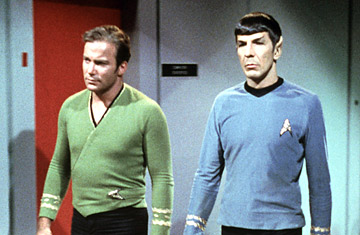
William Shatner and Leonard Nimoy in Star Trek
(3 of 3)
"Where No Man Has Gone Before," the very first episode filmed (but the third to go on the air), displays the series' kinship to contemporary and later s-f movies. It begins with the appearance of a memory-transmitter robot very like Star Wars' R2D2 (except this one is destructive), and it stars Gary Lockwood, just at the time he was filming 2001: A Space Odyssey. Here he plays an old friend of Kirk's who, through a radiation blast, finds himself evolving into a dangerous blend of the Star Child and HAL 9000 — a superior being who thinks himself a god. (Star Trek was suspicious of supermen.) "You should have killed me while you could, James," he snarls at the starship's captain. "Command and compassion is a fool's mixture." Until the end, when the two men engage in an extraordinarily silly fight, it's a well acted show (Lockwood is steely-cool, Shatner was never better) and a potent parable on the lure and the danger of seeking perfection. Whom the gods would destroy... are those who would be gods.
Tapping the talents of many fine pulp writers of the period (Richard Matheson, Robert Bloch, Theodore Sturgeon, Harlan Ellison, George Clayton Johnson) in this first season, Roddenberry introduced viewers to the Romulans and Klingons; had Spock telecommunicate with a lava monster known as the Horda (sort of a turtle with yellow-orange tumor streaks); brought the crew to a planet of hippie vegetarians turning on to a hallucinogenic plant; wove love stories for Kirk and Spock — and in one episode, brewed a love potion for the entire crew. In Matheson's "The Enemy Within," Kirk is split into two polar-opposite halves: one violent, one timorous. At the end he intones, "I've seen a part of myself no man should ever see." Well, kind of. The sight of Shatner essaying the double role of Hamlet and Hannibal Lecter is both ludicrous and wondrous, like the special effects in an Ed Wood movie.
But Star Trek was full of surprises, including the occasional undercutting of its hero. In "Errand of Mercy," the Enterprise crew is readying to fight the alien Klingons. The putative battlefield: the planet Organia, whose pacific inhabitants seem oblivious to the imminent threat. At the end, both Kirk and the Klingon commander Kor (John Colicos) get their comeuppance from the planet's supposedly weak, actually preternatural inhabitants. "It looks as though the Organians are not going to let us fight," Kirk tells Kor, who replies, "A shame, Captain. It would have been glorious!" The two warriors retreat in deferential wonder — just as Star Trek kept viewers wandering and wondering. It broke ground by breaking the rules of series TV. As Spock says in one of the show's first episodes, "Instruments register only those things they're designed to register. Space still contains infinite unknowns."
A word on the new box set. It has HD DVD on one side of each disc, standard DVD on the other. The content is essentially that of the 2004 edition (when all three seasons were put on DVD), with new six making-of extras from that set and three new ones, including a 90 min. doc, "Beyond the Final Frontier," made for the A&E Channel. The real news is that all episodes have been digitally remastered. In clarifying the image, the technicians added phaser beams, gave the Enterprise bomb bay doors, tweaked the ship's encounter with the sun and made other adjustments which may strike longtime fans as sacrilege but didn't bother me. (And Kirk's face is even shinier.) This edition will be a mandatory addition to every Trek-obsessive's collection. It certainly has me looking forward to the remastering of Seasons Two and Three.